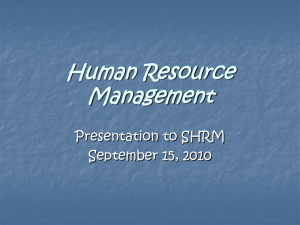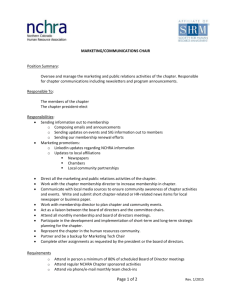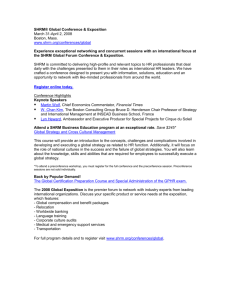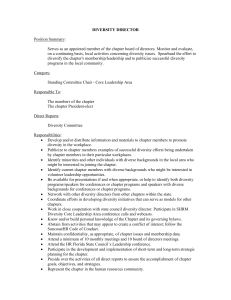Unit 3: Adult Learning Principles
advertisement
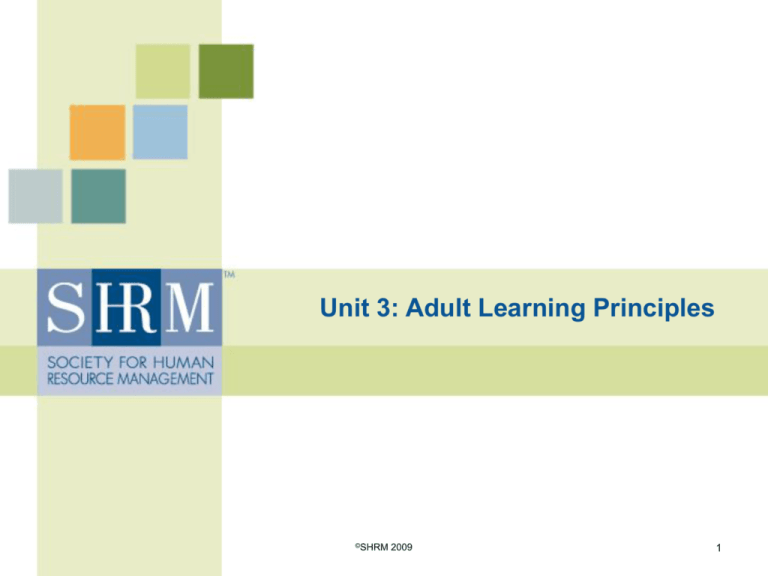
Unit 3: Adult Learning Principles ©SHRM 2009 1 Learning A relatively permanent change in human capabilities that is not a result of growth processes. Noe, 2008 2 ©SHRM 2009 Unit 3 Class 1: Adult Learning Principles Learning objectives: By the end of this unit, students will: 1. Define andragogy. 2. Define learning as a change in behavior or cognitive process. 3. Describe characteristics of adult learners. 4. Describe principles of adult learning. 5. Apply principles of adult learning to training. 3 ©SHRM 2009 Adult Learning Principles Adult learners are different. It’s not like working with children. ©SHRM 2009 Andragogy • Andragogy: The art and science of helping adults learn. • Educating adults involves understanding adult learning principles. Knowles, 1970 ©SHRM 2009 Adult Learning Theory • The andragogy model is based on several assumptions: > Adults have the need to know why they are learning > > > > something. Adults have a need to be self-directed. Adults bring more work-related experience into the learning situation. Adults enter into a learning experience with a problem-centered approach to learning. Adults are motivated to learn by both extrinsic and intrinsic motivators. Noe (2008) pg. 133 6 ©SHRM 2009 Learning Is Change • Learning is a change in behavior or cognitive process. • In training it is a change in knowledge, skill or attitude. ©SHRM 2009 Characteristics of Adult Learners • • • • • • • • • Control over learning. High motivation to learn. Pragmatic in learning. Learning may be a secondary role. Resistant to change. Adult learners are more diverse. Draw on past experiences in learning. Learning is often self-initiated. Learning is aimed at an immediate goal. Houle, 1984 Ball, 1996 ©SHRM 2009 What Is Learning? • Learning is a permanent change in human capabilities that is not a result of the growth process. • Learning outcomes: What do we learn? > Verbal information. > Intellectual skills. > Motor skills. > Attitudes. > Cognitive strategy. Noe, 2008 ©SHRM 2009 The Learning Cycle • The learning cycle is a dynamic process that involves four specific stages: > Concrete experience. > Reflective observation. > Abstract conceptualization. > Active experimentation. • The key to effective learning is to be competent in each of the four stages. 10 ©SHRM 2009 Learning Styles • • • • Diverger Assimilator Converger Accommodator 11 ©SHRM 2009 Kolb’s Learning Styles What Learning Style Are You? 12 ©SHRM 2009 Unit 3 Class 2: The Learning Process • How do people learn new information? > Visual. > Auditory. > Kinesthetic. 13 ©SHRM 2009 The Learning Process • Learning occurs through both mental and physical processes: > Expectancy. > Perception. > Working storage. > Semantic encoding. > Rehearsal. > Organization. > Elaboration. > Retrieval. > Generalizing. > Gratifying. 14 ©SHRM 2009 Learning Theories • Reinforcement theory: > People are motivated to perform or avoid certain behaviors because of past experience based on that behavior. • Positive reinforcement. • Negative reinforcement. • Extinction. > How can this theory be used in training? 15 ©SHRM 2009 Social Learning Theory • People learn by observing other people (models) they think are knowledgeable and credible. • The model’s behavior is adopted. • Self-efficacy: The individual must believe he or she iscapable of learning. • Four processes in learning: > Attention. > Retention. > Motor reproduction. > Motivation. 16 ©SHRM 2009 Goal Theories • Goal-setting theory: > Behavior results from a person’s intentional goals and objectives • Goal orientation: > Learning orientation. > Performance orientation. 17 ©SHRM 2009 Need Theories • A need is a deficiency that a person experiences at a certain time. • A need motivates a person to behave in a way that satisfies the deficiency. • Need theory suggests that trainers should identify the trainee needs and communicate to them how the training will satisfy that need. 18 ©SHRM 2009 Expectancy Theory • Behavior is linked to three factors: > Expectancies: The trainee’s belief that increasing effort will lead to higher performance. > Instrumentality: The trainee’s belief that performing a certain behavior will lead to an expected reward. > Valence: The value that the trainee places on the reward. • How does this relate to training? 19 ©SHRM 2009 Information Processing Theory • Information processing theory: > Information is taken in by the brain. > Information undergoes transformation. > Information is encoded into short-term or long- term memory. > Information is stored and available for later retrieval and use. > Feedback from the environment. 20 ©SHRM 2009 Learning Theories How will you apply these theories into your training design? 21 ©SHRM 2009
